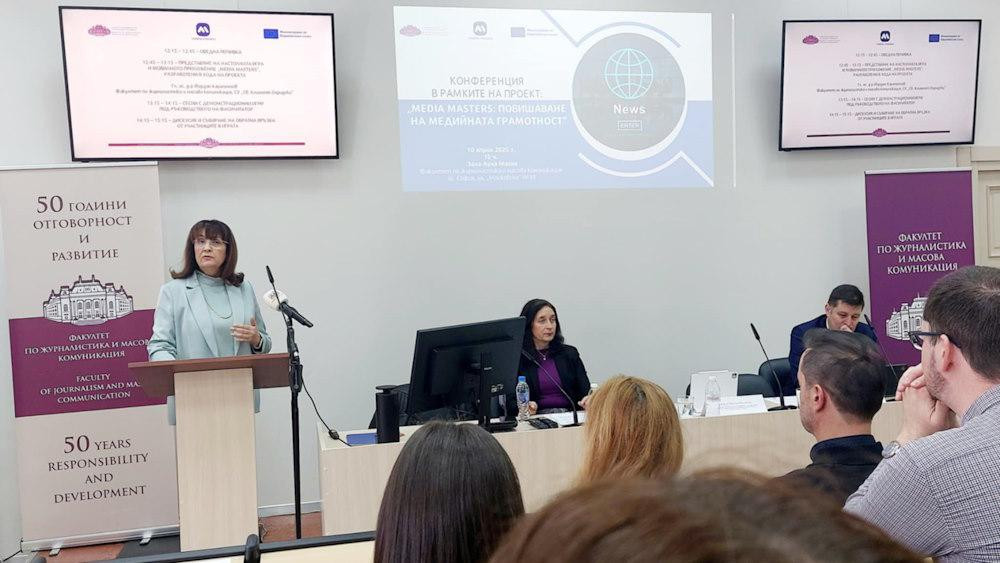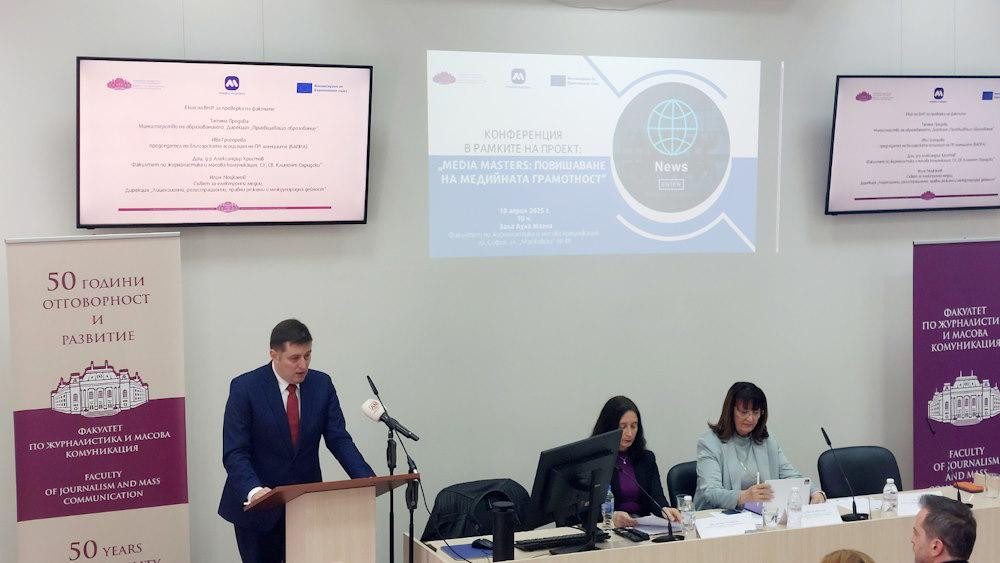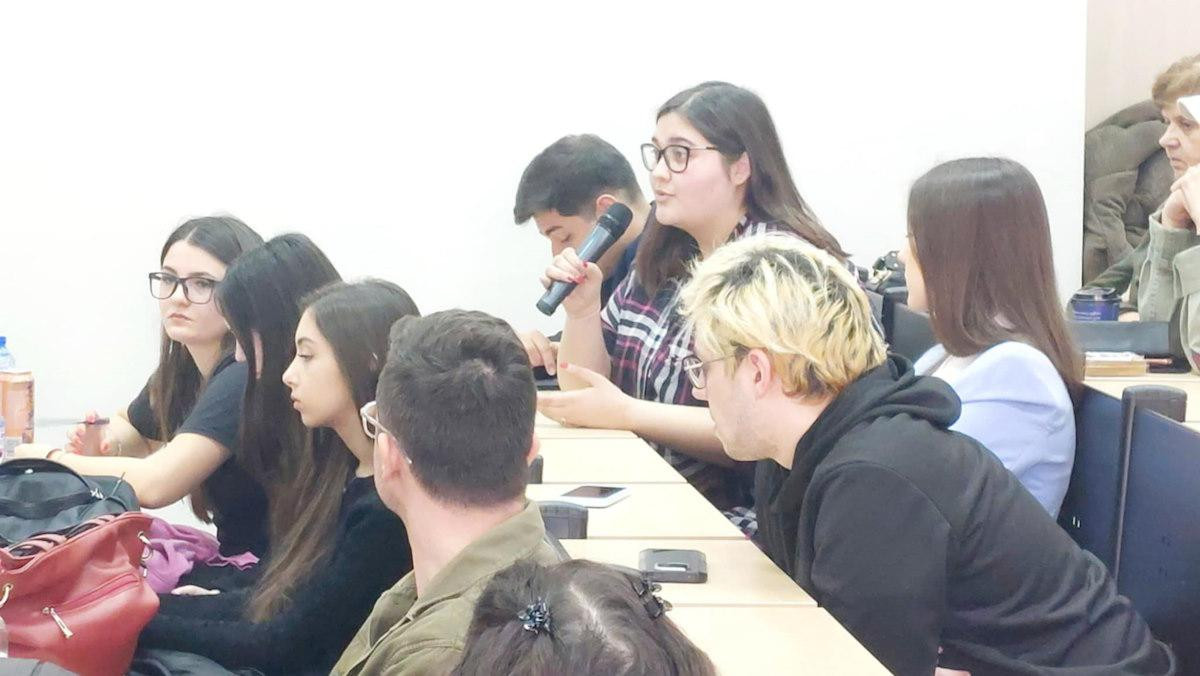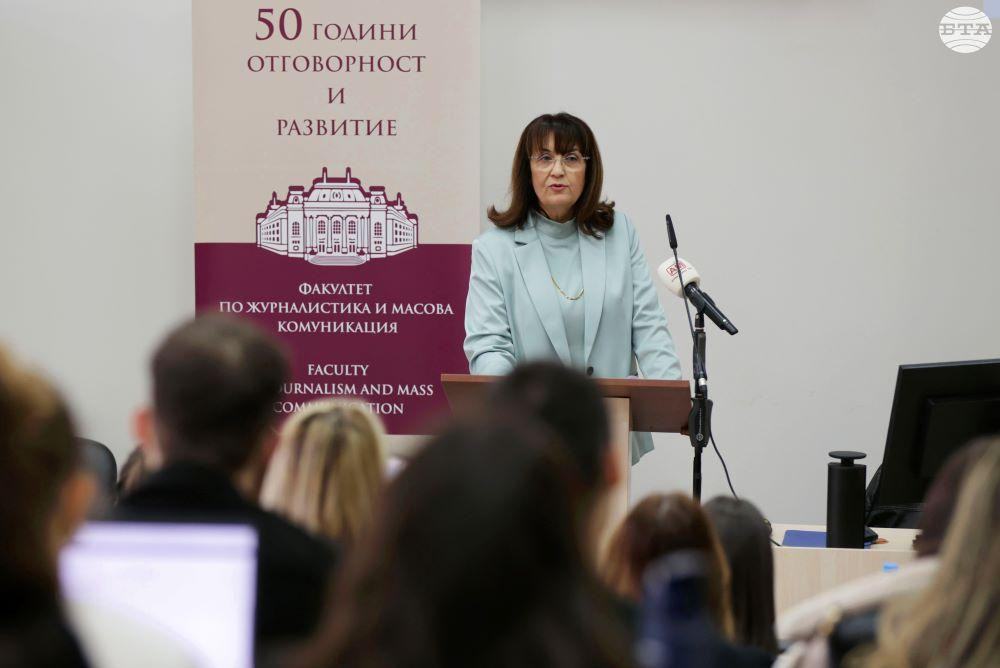The first conference on the topic “The Impact of Fake News on European Democracies” was held in the Aula Magna Hall of the Faculty of Journalism and Mass Communication at Sofia University “St. Kliment Ohridski.”
The event is part of the project “Media Masters: Enhancing Media Literacy” (CERV-2023-CITIZENS-CIV-01148165), funded by the European Union’s Citizens, Equality, Rights and Values programme.
The conference was opened by Prof. Veselina Valkanova, Dean of the Faculty of Journalism and Mass Communication and head of the project, who emphasized the importance of education and interinstitutional dialogue in the fight against disinformation.
During the event, she presented the “Media Masters: Enhancing Media Literacy” project, funded by the European Union’s Citizens, Equality, Rights and Values programme. As part of the project, a game and a mobile application have been developed, with the software already completed, Prof. Valkanova explained.
"In the development of the project we are presenting today, we united around the idea that in an age of disinformation and digital noise, media literacy is a key tool enabling people to make informed choices, develop critical thinking, build digital culture, and ultimately uphold democratic values," said the Dean of FJMC.
The project is being carried out by a consortium of nine EU countries: Bulgaria, France, Italy, Spain, Croatia, Greece, Cyprus, Slovenia, and Ireland.

Prof. Veselina Valkanova explained that students from both primary and secondary education levels will be involved in the project. She emphasized its practical orientation, noting that the project aims not only to educate but also to actively engage young people in media-related initiatives.
“It’s still too early to draw definitive conclusions,” said the Dean of the Faculty of Journalism and Mass Communication, “but I believe that through such group-based models, we can foster critical thinking and encourage young people to recognize disinformation and manipulative content.” She pointed out that both the game and the app developed under the project are designed for long-term use, beyond the project’s formal end.
According to Prof. Valkanova, the project’s focus is ambitious—it seeks to engage youth in specific social initiatives and in civic dialogue. One of the goals is also to collect valuable data for future research and feedback, the results of which will be published.
“We hope to make a significant contribution to the functional testing of the project’s first version, including the board game, and to assess how effective the development can be as a pedagogical tool for improving media literacy among young people,” she said.
She also shared that all scenarios and questions included in the game and app are based on real events. “Together with our colleagues in the consortium, we believe this is the most effective way to capture young people’s interest and encourage discussion and engagement,” Prof. Valkanova commented.
In addition to politics and political news, the game also includes topics more relatable to the target age groups. “Disinformation is a complex phenomenon that is spreading widely on a global scale, and it has the potential to undermine human rights and seriously threaten European democracies. What’s more, recent technological advances have made disinformation even harder to detect. Now, artificial intelligence comes into play, enabling fake news, deepfake videos, and online scams to reach unprecedented levels of credibility. The real threat lies not just in the existence of fake content, but in how rapidly and massively it spreads,” she stated.
Prof. Valkanova stressed that cybersecurity today is not only a technological issue, but also one of human behavior.
She believes that the best way to counter disinformation is through educational projects, programs, and campaigns—both in new digital environments and traditional media. “It’s true that young people use social media and digital platforms differently. This can support the development of civic engagement. However, I don’t agree with some scholars who claim that such engagement arises spontaneously from the use of digital media. On the contrary—I believe media literacy education is absolutely essential to provide the cognitive and social framework—the scaffolding—upon which these attitudes, reflexes, and ultimately civic engagement and social empathy can be built,” concluded Prof. Valkanova.

BNR Director General Milen Mitev Stresses the Need for Strong Public Media in the Fight Against Disinformation
An official address was delivered by Milen Mitev, Director General and Chair of the Management Board of the Bulgarian National Radio (BNR) and a member of the Executive Board of the European Broadcasting Union (EBU). He highlighted BNR's strong commitment to fact-checking and providing audiences with access to reliable information sources.
“Quality journalism is increasingly difficult to fund,” Mitev noted, “because more and more people believe that anyone can be a journalist just by creating audio or video content on their phone.” According to him, it's becoming harder to explain the value of traditional media institutions, whose seemingly cumbersome structures actually offer some guarantees that their content will be verified.
“This financial pressure comes at a time when strong media is needed more than ever,” Mitev stressed. “Efficiency is a good thing, but when we're trying to counter disinformation, both public and commercial media must be strong.” He shared a recent conversation with the Director of the BBC, who mentioned that in all the countries where the BBC World Service has withdrawn, Russian channels have taken over the frequencies—a telling example, Mitev said.
He cited data from the 2022 Eurobarometer survey, which found that public service media news ranks as the most trusted source of information in 28 out of 31 European countries surveyed, including 25 EU member states. “On average, 49% of EU citizens trust public broadcasters the most, followed by the press at 39%, and commercial media at just 27%. That’s a significant trust gap,” Mitev emphasized.
He pointed out several key challenges facing today’s media and societies: information overload, rising competition for audience attention, and the devaluation of the journalism profession.
Other Participants and Key Topics
The conference also featured:
- Ivo Todorov, Director of Digital Programs at BNR
- The BNR fact-checking team, who shared their experiences in combating disinformation
- Iva Grigorova, Chair of the Bulgarian Association of PR Agencies (BAPRA)
- Iliya Lyutskanov, Senior Expert from the Council for Electronic Media
The discussions centered on the threats facing European democracies amidst growing information noise and manipulation, and emphasized the need for sustainable policies and educational tools to improve media literacy across society.

Assoc. Prof. Mila Serafimova introduced the board game and mobile app developed under the “Media Masters: Enhancing Media Literacy” project. “This game can be played with a moderator, who could be the teacher in a classroom setting, as students are already exposed to media literacy themes in homeroom or other subjects,” she explained. According to her, such a game-based approach can effectively illustrate key aspects of media literacy. “We helped by designing topics for debates and classroom discussions with students,” she added.
Dr. Yordan Karapenchev, who presented the mobile application, pointed out that one of the major challenges of the project was creating something meaningful that could work across several countries. “One of the sample questions in the board game is whether the literary works of Hristo Botev might be removed from school curricula—a recurring public concern in Bulgaria. But in France, that means nothing to the audience. They have their own issues and educational focus,” he explained. “So the solution we found was for each country to generate its own set of questions, which is a key component of the game’s design.”
Program Highlights Included:
- A panel discussion on the impact of disinformation on democratic processes
- A presentation of the “Media Masters” board game and mobile app
- Demonstration games with audience participation, focusing on identifying manipulative content
- An open discussion with active contributions from students of the Faculty of Journalism and Mass Communication
The event provided a valuable platform for collaboration between academia, media professionals, and civil society representatives. Its goal was to foster a more informed, critically thinking, and resilient public—one capable of effectively confronting the challenges of modern disinformation.
